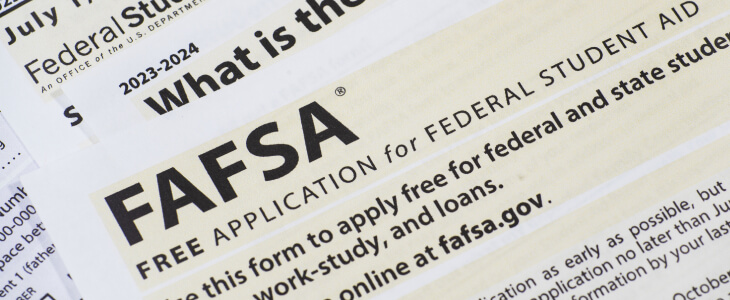In its landmark Brown v. Board of Education decision back in 1954, Chief Justice of the Supreme Court Earl Warren recognized that education is so critical to American youth that “it is doubtful that any child may reasonably be expected to succeed in life if he is denied the opportunity of an education.”
Chief Justice Warren’s observation nearly 100 years ago becomes truer every day, and today most educators push their students towards seeking some manner of post-secondary education. But attending college or trade school can be tremendously expensive, so in the spirit of Chief Justice Warren’s reflection on access to education Congress created a federal financial aid program to help enable students to access higher education.
Like many government programs, however, the application process (called a FAFSA, or Free Application for Federal Student Aid) can be a bit onerous, particularly for students whose parents are divorced. It is confusing for divorced parents and their children particularly as to how child support factors into their financial aid package. Here are answers to some common questions from the perspective of the student who is applying for financial aid and for divorced parents who are assisting their children in the process.
Do I need to list my parents’ information?
Part of the purpose of completing a FAFSA includes providing information about the student’s household income to determine how much financial contribution the student should reasonably be expected to contribute to his or her own education.
Independent Households versus Dependent Households
Some students are considered to be “independent” households, meaning they do not rely on their parents or anyone else for financial support. Examples of independent students include students who are married, students who are active duty servicemen or veterans, students who are in foster care, and students who have their own dependent children. Because independent students do not rely on financial support from their parents, they are not required to submit information about their parents’ income levels.
Students who do not qualify as independent, however, are considered to be a part of their parents’ households, and consequently their parents’ income is taken into consideration when determining the appropriate levels of federal financial aid for the student. For students with traditional nuclear families this process is relatively straightforward, but for those of us whose families include separations, divorces, remarriages, adoptions, and other more modern family arrangements, figuring out who qualifies as a “parent” can be complicated.
Which parents do I need to list?
The FAFSA is designed to solicit information about the student’s “legal” parents, meaning the adults that the state considers legally responsible for the student; for example, if a student has been adopted, the legal parents would be the adoptive parents, not the biological parents. To accomplish that goal, the FAFSA includes the following three ‘yes-or-no’ questions to help determine which parents’ information to list:
- Are you parents married?
- If your parents are married, each of their income information must be listed on the FAFSA.
- If your parents are not married, answer Question 2.
- Do your parents live together?
- If your parents live together, both of their incomes must be listed on your FAFSA, even if they are not married or are divorced or separated.
- If your parents do not live together, answer Question 3.
- Have you lived with one parent more than the other over the past year?
- If you lived with one of your parents more than the other in the past 12 months, that parent needs to be listed on the FAFSA. Additionally, if this parent is now married to someone else, that step-parent’s income information must also be listed.
- If you have lived with each parent an equal amount of time in the past year, the parent who provided more financial support is the parent who should be listed, as well as his or her spouse if the parent is now married to a step-parent.
Contact a Divorce Attorney Today
Financing your child’s education combines the stress of trying to make ends meet with the stress of trying to ensure your child has access to the services he or she needs to be successful, and when the additional stress of complicated family relationships is added to the mix it’s easy for the situation to become overwhelming.
But these are issues that frequently come up in divorces, and our firm’s attorneys have been working with clients for decades to sort through these kinds of issues and arrive at solutions to help our client’s children transition successfully into their post-secondary lives. If you have questions about how your divorce might impact your child’s education, call me today at the Law Offices of Peggy Roston.
Posted in: Divorce

